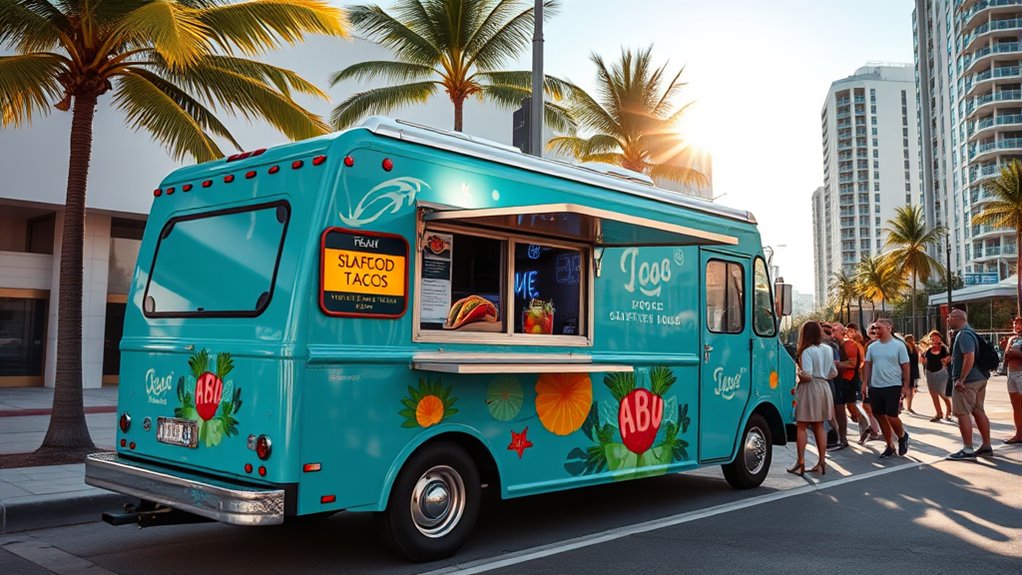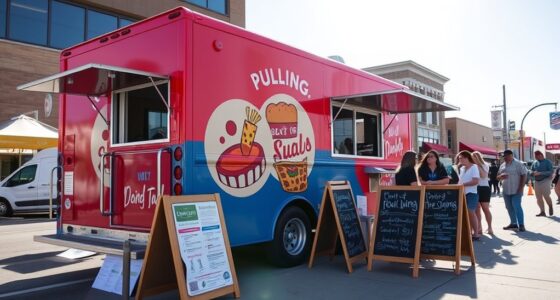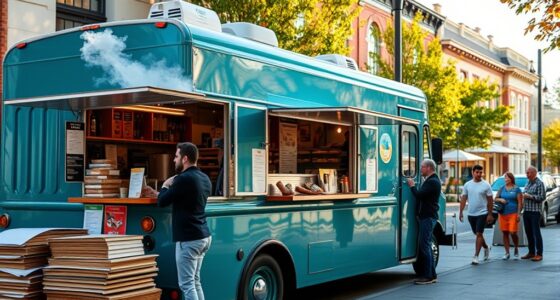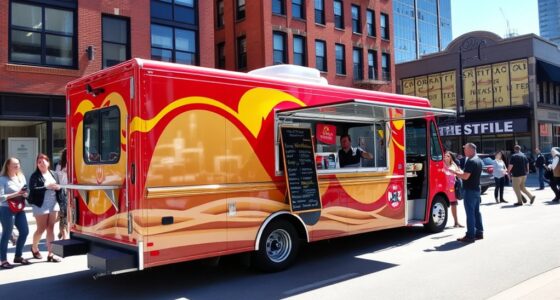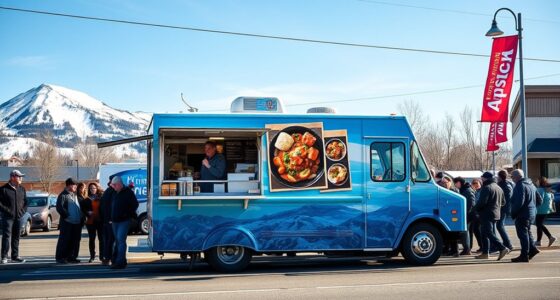To open a food truck in Miami, you’ll need permits like a Certificate of Use, Mobile Food Permit, and Business Tax Receipt, which you renew annually. Expect startup costs between $40,000 and $150,000, depending on your truck and equipment. Find prime spots near parks, events, or busy neighborhoods, and guarantee zoning compliance. Craft a diverse menu with multicultural flavors and use social media for marketing. Continue exploring these steps to launch your successful food truck business.
Key Takeaways
- Obtain necessary permits such as Certificate of Use, Mobile Food Permit, and Business Tax Receipt, ensuring compliance with Miami zoning laws.
- Estimate startup costs, including truck purchase or rental, equipment, permits, and marketing, which can total from approximately $1,864 to over $28,000.
- Select high-traffic, accessible locations like Little Havana or parks, and secure zoning approval and permit visibility for legal operation.
- Create a diverse menu featuring multicultural flavors and portable items tailored to Miami’s vibrant culinary scene.
- Use social media, local events, collaborations, and digital tools to enhance visibility, attract customers, and grow your food truck business.
Navigating Permits and Licenses in Miami
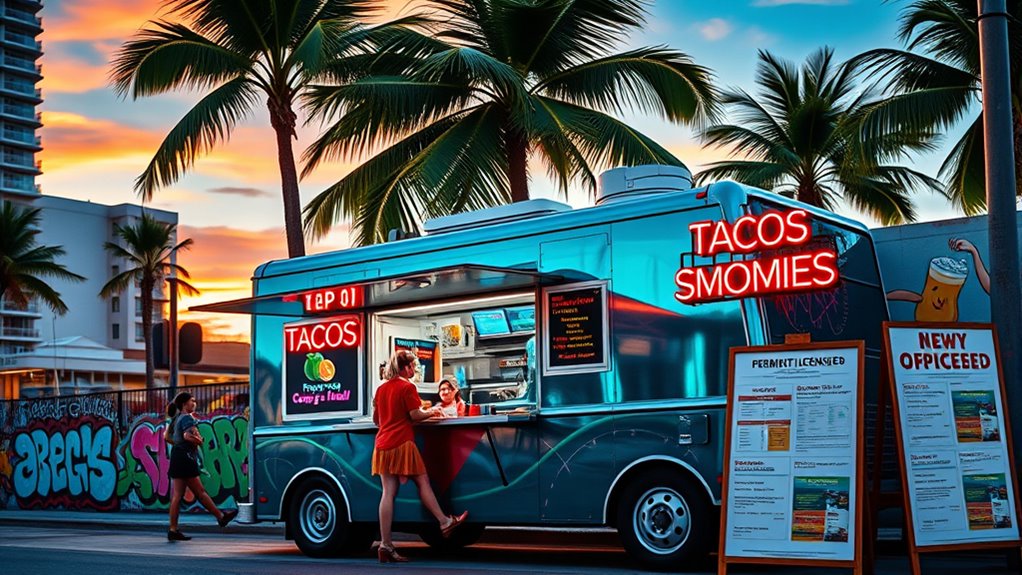
Managing permits and licenses in Miami can seem complex, but understanding the key requirements makes the process smoother. First, you’ll need a Certificate of Use (CU), which shows you’re authorized to operate in Miami-Dade zoning districts and must be renewed annually. Next, obtain a Mobile Food Permit—required for serving raw or prepackaged foods—through Florida’s Department of Business and Professional Regulation or the Department of Agriculture. You also need a Business Tax Receipt from the city, which covers local tax obligations. Additionally, a Florida Food Service License certifies your compliance with food safety standards, and you must register for sales tax collection with the Florida Department of Revenue. Remember, all permits must be visible on your truck, and zoning restrictions limit where you can operate, especially near residential areas or sensitive zones.
Estimating Startup Expenses for Your Food Truck
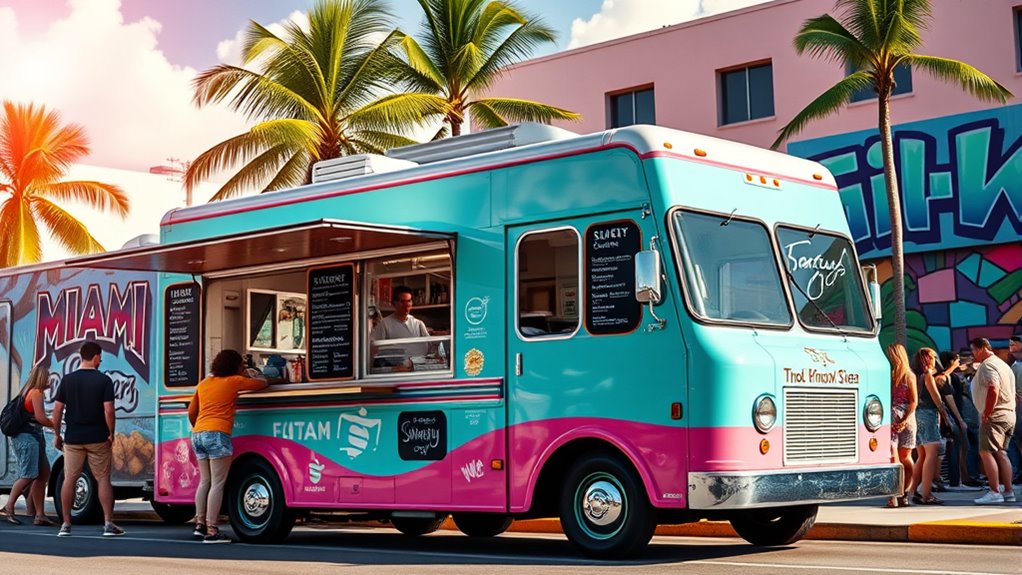
Estimating your startup expenses is a crucial step in launching a successful food truck business in Miami. Your costs vary depending on truck type, equipment, permits, and marketing. A new custom-built truck can cost between $75,000 and $150,000, while used trucks range from $40,000 to $80,000. Renting is an option at $2,000 to $3,000 per month for testing purposes. Equipment costs for appliances and supplies typically fall between $40,000 and $45,000, plus $2,000 to $4,600 for initial inventory. Licensing and permits can total from $1,864 up to $28,276. Marketing expenses, including branding and advertising, range from $3,000 to $10,000. Budget for working capital of $20,000 to $30,000 to cover ongoing costs and unforeseen expenses. Proper planning around startup budget ensures you are prepared for all expenses involved.
Finding Prime Locations and Navigating Zoning Laws
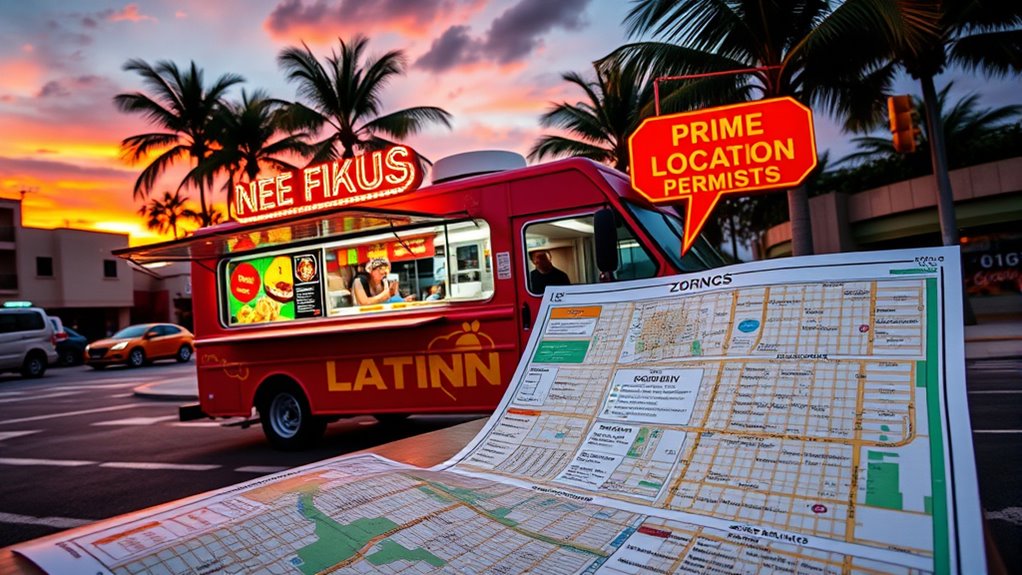
Choosing the right location is key to your food truck’s success in Miami. Prime spots include Little Havana, with busy intersections and tourist traffic, costing around $500/month after a free trial. Miller Drive offers a central, green setting ideal for fresh menus, with monthly fees between $1,100 and $2,500. Amelia Earhart Park attracts families and foodies for regular events, while Haulover Park Beach and Pelican Harbor draw locals and tourists, perfect for beach-themed menus. Tropical Park hosts popular weekend events. Remember, compliance with Miami-Dade zoning laws is essential; trucks must operate in approved zones, and permits are needed for special events or park locations. High-traffic, accessible spots with nearby businesses or parks maximize visibility and customer flow. Miami Food Park Locations include various spots that provide amenities like parking, electricity, and water, making them ideal for food truck operations seeking high visibility and convenience. Ensuring that your chosen location aligns with local zoning laws can prevent potential legal issues and fines.
Crafting a Menu That Appeals to Miami’s Diverse Tastes
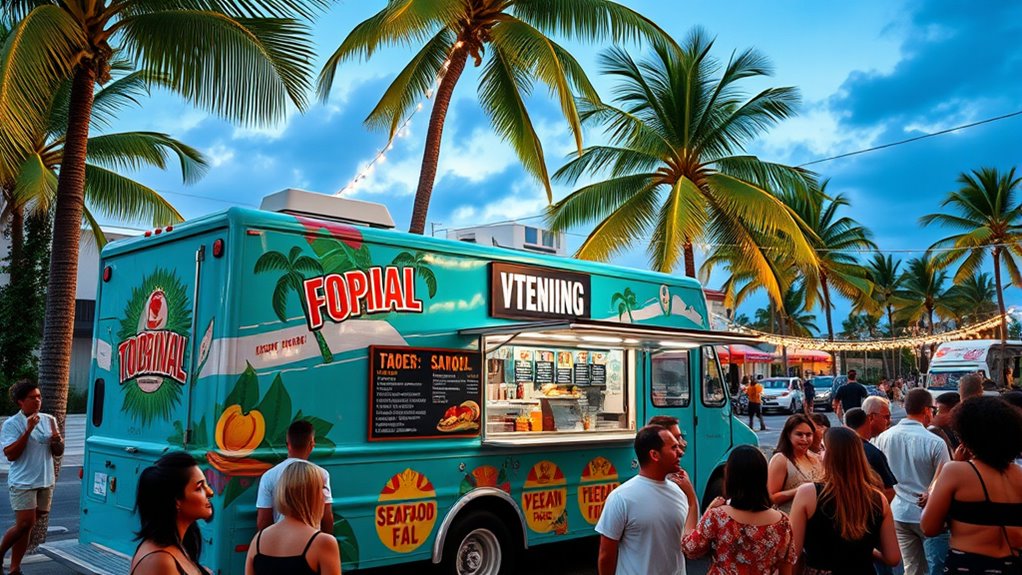
To succeed in Miami’s vibrant food scene, your menu must reflect the city’s rich multicultural influences and diverse tastes. Focus on bold flavors from Latin America, Cuba, the Middle East, and India, blending traditional dishes with innovative twists. Prioritize portable, quick-to-prepare items like tacos, wraps, and handheld sandwiches that cater to busy crowds. Incorporate health-conscious options such as vegan, gluten-free, and fresh ethnic dishes to appeal to a broad customer base. Use the table below to inspire your menu offerings:
| Latin American | Cuban Classics | Mediterranean & Middle Eastern |
|---|---|---|
| Tacos | Cuban Sandwiches | Shawarma & Hummus |
| Arepas | Roasted Pork | Pita Wraps |
| Empanadas | Quesadillas | Kafta Lamb |
| Nachos | Smoked Ham | Falafel Wraps |
| Burritos | Swiss Cheese | Tahini & Middle Eastern Sides |
Additionally, understanding Miami’s diverse culinary landscape can help you craft a menu that resonates with both locals and tourists. This includes exploring regional ingredients and popular flavors that are unique to the area.
Effective Marketing Strategies to Grow Your Food Truck Business
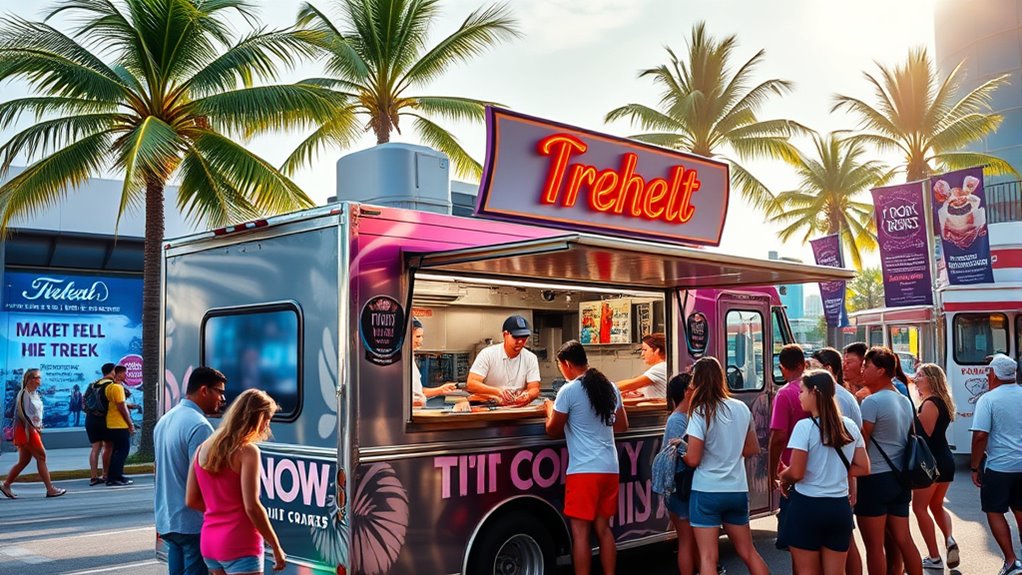
Effective marketing is essential for growing your Miami food truck business and standing out in a competitive scene. Leveraging social media platforms like Instagram and TikTok lets you showcase your menu and truck locations, attracting younger crowds. Consistent posting with trending hashtags boosts follower growth and engagement by over 20%. Collaborating with local influencers and food bloggers can increase your reach by 30–50%, driving more in-person visits. Sharing behind-the-scenes stories and customer testimonials builds trust and loyalty. Participating in local festivals and events exposes your truck to new customers, with mobile events offering up to 50% higher sales. Implementing loyalty programs, digital ordering, and eco-friendly branding further enhances customer retention and brand reputation, helping your business thrive in Miami’s vibrant food scene. Additionally, integrating digital tools like GPS and review platforms can improve your visibility and customer targeting, leading to a 30% increase in sales and stronger community engagement. To further refine your marketing efforts, understanding Etsy Shops SEO strategies can help you effectively target niche audiences interested in food-related merchandise or branding materials.
Frequently Asked Questions
How Long Does It Take to Obtain All Necessary Permits in Miami?
You’ll typically need about 4 to 8 weeks to get all the permits in Miami. Start by preparing your documents, which takes 1-2 weeks. Applying for the MFDV license and health inspections can take another 4 weeks. Local permits and commissary agreements might add extra time, especially during busy seasons. To avoid delays, submit complete paperwork early and coordinate with local authorities.
Are There Specific Insurance Requirements for Operating a Food Truck in Miami?
Imagine you’re starting a food truck in Miami and want to stay compliant. You’ll need commercial auto insurance since your truck is a business vehicle. Additionally, you must get general liability insurance to cover customer injuries or property damage, and possibly inland marine insurance for transport. These policies protect you from legal and financial risks, ensuring you meet Florida’s legal requirements and can operate smoothly in Miami’s bustling food scene.
Can I Operate My Food Truck Without a Fixed Location?
You can operate your food truck without a fixed location, but you must follow specific rules. Miami-Dade limits trucks to 30 consecutive days at one spot and requires permits like a mobile food dispensing license and health permits. You need to park on approved private property or at special events, avoid public right-of-way, and respect zoning laws. Staying compliant guarantees your mobile operation runs smoothly and legally.
What Are the Health Inspection Frequency and Requirements in Miami?
Miami’s meticulous monitoring mandates multiple inspections, based on risk. High-risk trucks face quarterly checks, moderate-risk biannually, and low-risk annually. You must guarantee cleanliness, proper food handling, and pest prevention during each inspection. Be prepared with employee training records and maintenance measures. Complying with the same standards as restaurants, your food truck’s focus should be hygiene, temperature, and safety, with inspections focused on controlling contamination, pests, and ensuring proper procedures.
Are There Restrictions on Alcohol Sales With a Mobile Food Truck?
You can’t sell alcohol from your mobile food truck in Miami without a special license. Local laws prohibit alcohol sales from moving trucks, and you must get a separate state license, which can be costly and complex. Alcohol sales are only allowed at fixed locations or specific events with special permits. Trying to sell alcohol without proper authorization can lead to fines, penalties, and losing your operating privileges.
Conclusion
So, now that you’re armed with permits, a killer menu, and prime spots, all that’s left is to hope Miami’s unpredictable weather doesn’t turn your food truck into a mobile swimming pool. Remember, with enough marketing and a dash of luck, you might just become Miami’s next food sensation—or at least the subject of some viral memes. Either way, enjoy the ride, and don’t forget to smile through the chaos!
